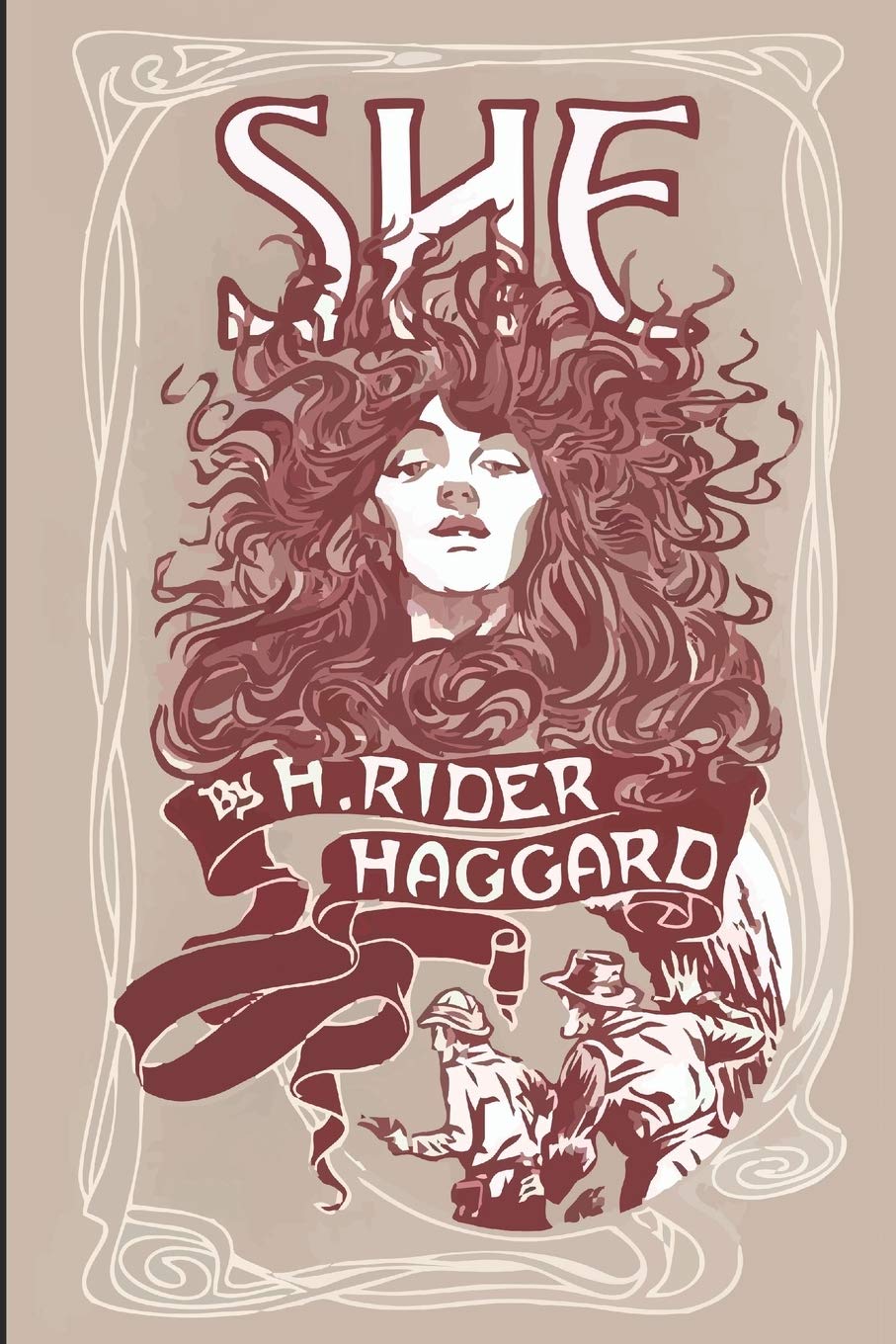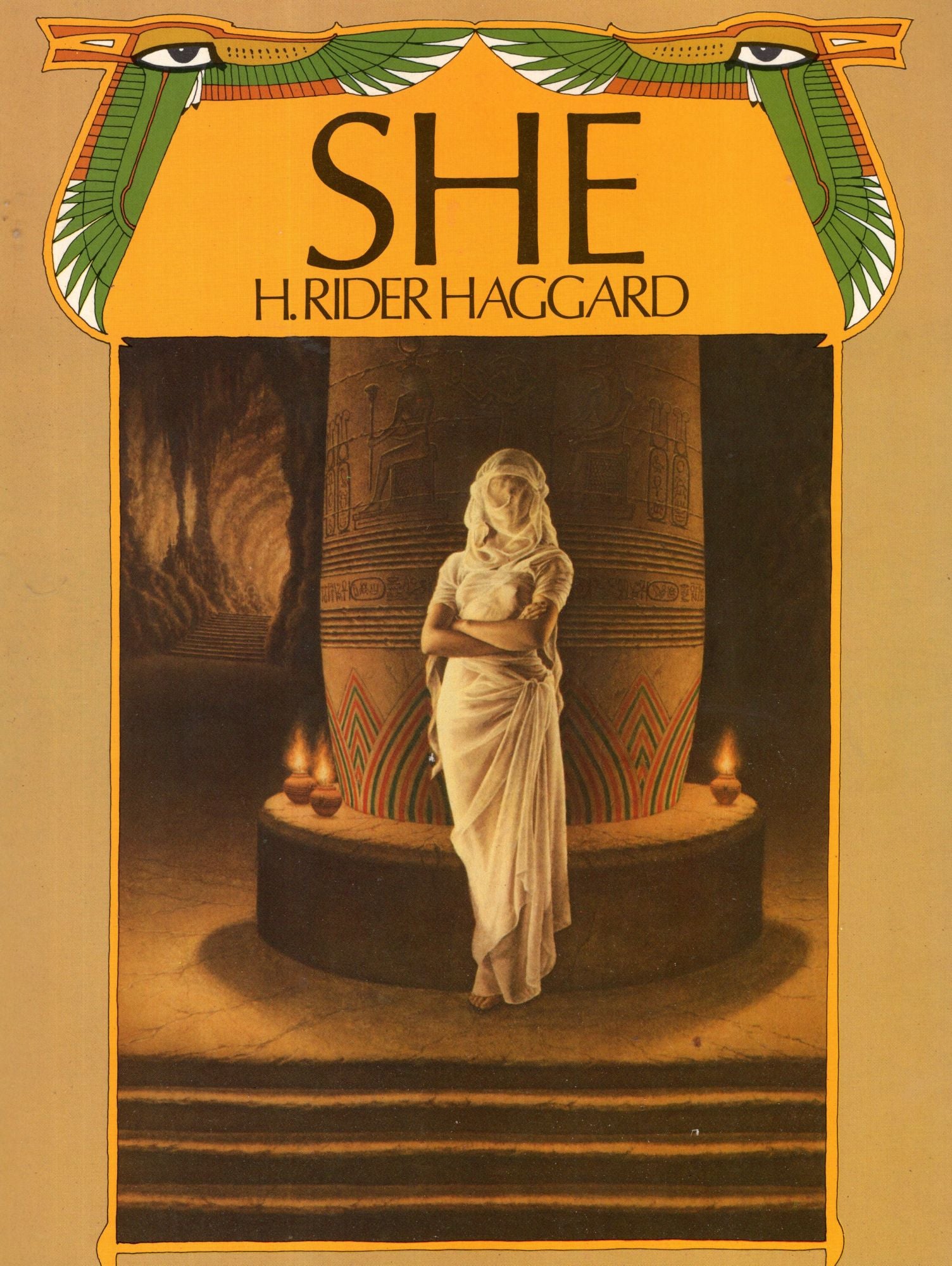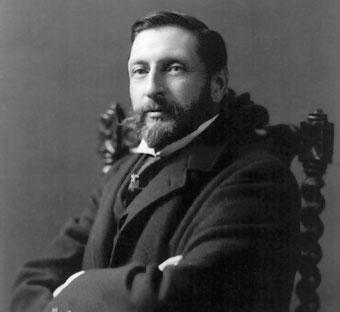TRENDS DIE OUT/LEGENDS LIVE ON
Reviewed by
![]()
SHE is arguably the best adventure/exploration story ever written…But that’s just the tip of the iceberg. What this really is about is a soul-searching/mind-bending LEGEND disguised as the former. Haggard has set the standards so high that no other book, movie, game, or AI generated content can ever surpass what Haggard has been able to project in the mind of the reader via his written words.
Haggard raised the standards of adventure/mystery narrative to heights that to this day have not been matched, and most likely never will. Haggard redefined what can be done with the genre. I feel spoiled but also humbled, being able to read, study, and review his body of work.

PLOT:
What we read here is the memoir of main character Horace Holly. When Leo Vincey was still a toddler, his biological father (and Holly’s only real friend) reveals a dark secret to Holly just before he dies of a disease he contracted on a trip to Central Africa. As a result, Holly assumes guardianship of Leo (who was 5 at the time) along with his family wealth and a suitcase for Leo only to open on his 25th birthday.
Without spoiling things too much, the contents of that suitcase will see Holly and Leo travel to a mythological civilization named Kôr, in Central Africa.
Holly’s memoir is an account of that voyage.
ADVENTURE/PERILS/HARDSHIP:
This is where Haggard really pushes the envelope of what can be achieved in what we would call the ‘Indiana Jones’ adventure genre. The path to Kôr is dangerous and life-altering. The scene of the storm while they’re at sea (chapter 4) is probably the most gripping scene of its kind. Out of a crew of about 20 only 4 make it to shore. Once they reach land our protagonists will have to deal with the harsh elements of the region, its animal kingdom (witness the most brutal fight between lion and alligator in chapter 5!), and a local tribe of flesh-eaters who adopt the most sadistic ritual called ‘hot-potting’ to kill their victims before they eat them (it seems like the human body dying in fear and pain tastes better to them!)
And this is just the beginning!
FEMALE VILLAIN:
Another bar that Haggard manages to set very high is that of the female villain character. Today’s writers for the most part fail miserably at capturing what should really define a female villain. Here is where we get introduced to Ayesha who is simply known as She or She-who-must-be-obeyed, as the locals call her.
Ayesha is mysterious, evil, scary…But also beautiful, irresistible, wise beyond any mortal, and truthful. Her beauty is so otherworldly that she has to wrap herself in thin white veils. As Holly writes in his memo: “The truth is veiled, because we could no more look upon her glory than we can upon the sun. It would destroy us.”

KÔR:
Haggard is very detailed with the geographical account of this lost nation called Kôr. Located north of the Zambezi river and once a very advanced civilization, it was eventually decimated by a plague. The few who survived fled and eventually funded what we know as Ancient Egypt. All the cities of Kôr were abandoned, including the enormous cave system they had created. Only a few scattered tribes eventually settled in the area but never dared to go near the cities for fear of the ghosts of those who died by the plague. About 400 B.C. Ayesha (who seems to be from the line of Ishmael) moved to the area and made her kingdom out of the caves, whereby she ruled the local tribes through fear and terror ever since.
CLOSING REMARKS:
Is this an action/adventure story? Yes and no.
This is a psychological and spiritual masterpiece disguised as an action/adventure book. It pushes the boundaries of how a finite human mind would handle the interaction with a god-like creature of infinite beauty and wisdom. How much could the human psychic take before snapping? Ayesha interacting with Holly and Leo is comparable to trying to pour a gallon of water into a 16-ounce cup. Too much beauty, too much knowledge, too much wisdom. As Holly himself puts it: “No man who once had seen She unveiled, and heard the music of her voice, and drunk in the bitter wisdom of her words, would willingly give up the sight for a whole sea of placid joys.”
This deals harshly with the finite limitations of the human psyche. Today we live in a society where the self is exalted. The worship of the self is probably the most widespread ‘religion’ in the West. I am strong, I am brave, I can accomplish anything! But reality is, man is puny and the human mind has limitations.
Before closing, I’ll leave you with this excerpt from Holly’s memoir, and please go read SHE!
“Who would so load up his back with memories of lost hours and loves, and of his neighbour’s sorrows that he cannot lessen, and wisdom that brings not consolation?”


Great writer, terrific book. I’m currently halfway through a reread of King Solomon’s Mines. He could really spin a tale.
King Solomon’s Mines MC and She will meet in another story!
Haggard was done a grave disservice by that awful movie adaptation in the ’80s. Alan Quartermain came off like a cheap Indiana Jones clone, when it was Indie who borrowed from (the literary) Quartermain.
You won’t be able to read Haggard and look at any of the modern Indiana Jones with the same eyes
This sounds like something I have to read, not least because it sounds like it somewhat parallels my own efforts to explore the fate of immortals in my series The Rosteval Saga (particularly from book 2 on).
My immortal beings vary in temperament, disposition, and all manner of things, but I play with the idea that immortality makes people both *more* and *less* human: they have to be able to handle a kind of continuous, eternal present–one moment, projected through the future–since they will never grow old and die.
This means their minds have to be adapted to handle eternity, especially if they have a special role to play–a guardian of some kind. At the risk of tooting my own horn, I think it creates an interesting form of stakes: a character becoming immortal can be a kind of loss in itself, since they will start to see the world in very different ways.
For your writing to come to my mind when reading this masterpiece speaks volume of the quality of your work, Michael
Thank you so much, my friend!